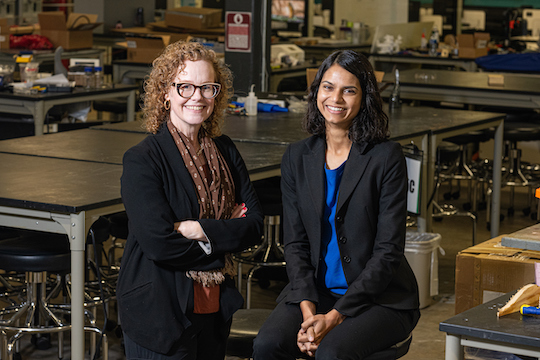
The US National Institutes of Health (NIH) has provided a five-year grant to support the development of an innovative undergraduate bioengineering curriculum component intended to cultivate inclusive design principles for students at Rice University in Houston who are contemplating a career as medical practitioners or medical technology innovators.
Sabia Abidi (pictured above, at right), an assistant teaching professor of bioengineering at Rice, and Kirsten Ostherr (pictured above, at left), Rice’s Gladys Louise Fox professor of English and director of the Medical Humanities Research Institute, gained NIH support for a clinical-immersion project that seeks to enhance Rice’s undergraduate bioengineering curriculum to further address inequities in health care delivery and account for the complex clinical settings in which medical devices are used.
In collaboration with the Texas Heart Institute and Texas Children’s Hospital, the new immersion programme will enable a group of Rice bioengineering juniors and seniors to observe and interact with clinical settings in a paediatric intensive care unit and a cardiology and heart surgery centre. In addition to clinical observation, the programme will introduce students to key aspects of physiology, technology, communication, entrepreneurship and health care disparities that affect the development of medical technologies and devices in order to cultivate an inclusive, human-centred approach to medical design.
‘We’re taking a very intentional approach to providing an educational experience that has the potential to transform the trajectory of the engineering design process from its earliest stages, leading to more effective solutions and better trained bioengineering graduates,’ Abidi said. ‘Through this project, our team hopes to really get students thinking about what populations are not being served and how to make sure their needs are really being met.
‘There is so much that you take for granted in a hospital setting,’ she continued. ‘I think it’s very important to look at things from different stakeholders’ points of view. Our hope is that whenever students engage with medical design and seek a solution in their capstone project, they are informed by a perspective that takes health care inequities into account.’
The team of faculty and physician investigators involved in the programme is equipped with wide-ranging expertise in cardiology, entrepreneurship, paediatric critical care, medical humanities and bioengineering, as well as a track record of successful collaboration in publication and performance in national design competitions.
‘I’m excited about this collaboration with Sabia and our colleagues in biomedical engineering, because bringing the medical humanities together with the people who are making the devices and our colleagues in the clinic really helps us address all of the pieces of what it means to care for the full person,’ Ostherr said.


